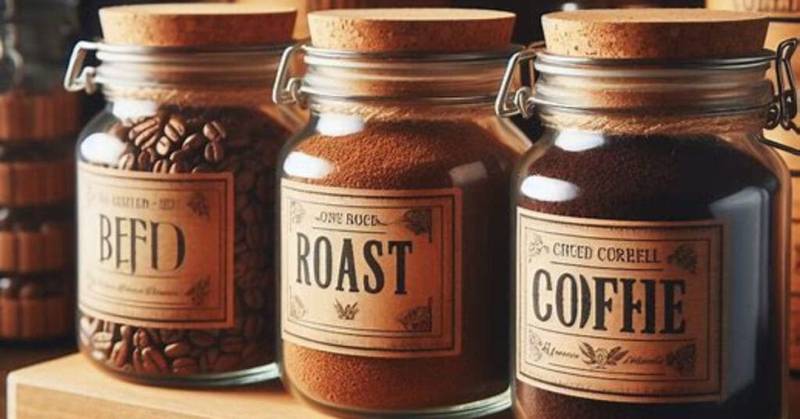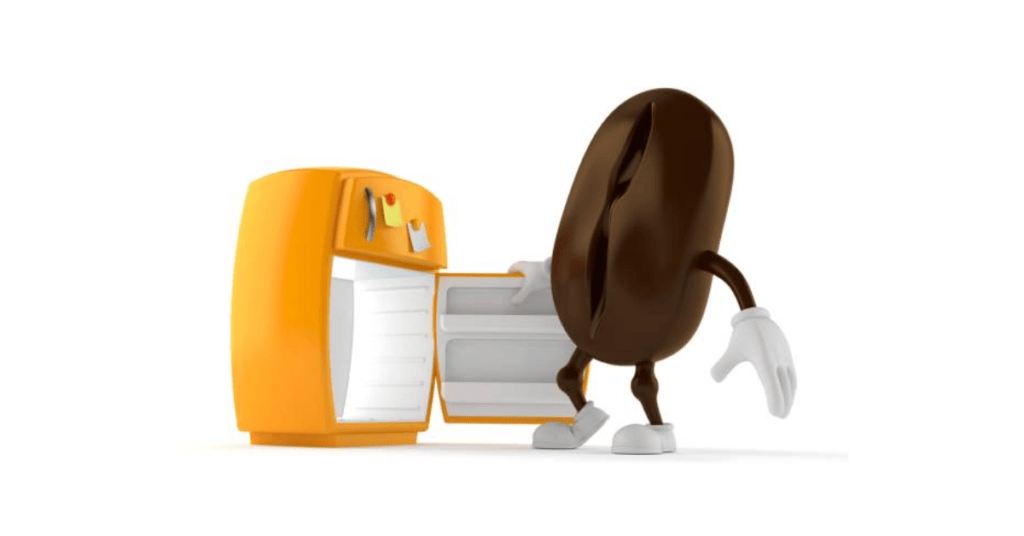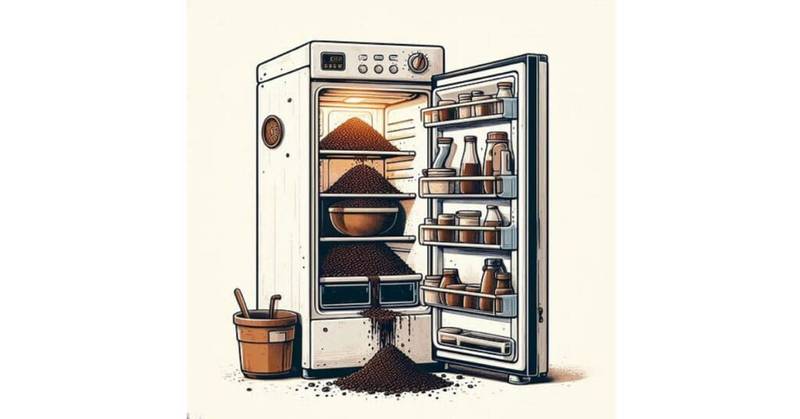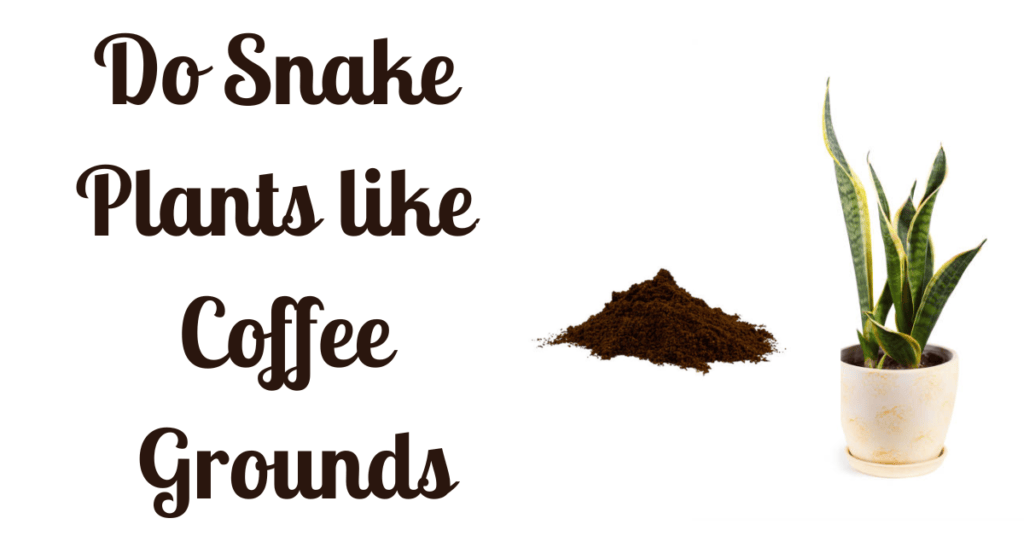When delving into the realm of enjoying a freshly brewed cup of coffee, one often encounters the crucial query: “How do you store ground coffee once it is opened?”
This inquiry arises from the desire to preserve the rich flavors and aromas that make each sip a delightful experience.
Proper storage is a critical factor in maintaining the freshness of ground coffee, ensuring that it retains its optimal taste over time.
The importance of understanding “how to store Ground Coffee once opened” lies in safeguarding against flavor deterioration caused by factors such as exposure to air, moisture, and light.
In this introduction, we will explore practical methods and best practices for storing opened-ground coffee to prolong its shelf life and uphold the integrity of its flavor profile.
So, whether you are a coffee aficionado or a casual drinker, mastering the art of storing ground coffee becomes a valuable skill in pursuing the perfect cup.
Table of Contents
How to Store Ground Coffee Once Opened || How to Keep Ground Coffee Fresh for Months?

Ensuring the prolonged freshness of ground coffee is paramount to preserving its flavor and aroma over time.
According to the (SCAA) standards, the key elements impacting coffee freshness include the form of coffee (whole beans or ground) and environmental factors like oxygen, temperature, moisture, and time passage.
To keep ground coffee fresh for months, follow these essential guidelines:
Airtight Storage:
Opt for a container with a secure, airtight seal to minimize the coffee’s exposure to air.
Oxygen is one of the primary culprits behind flavor degradation, causing coffee to go stale.
Vacuum-sealed containers offer an extra layer of protection by removing excess air before sealing, further extending the coffee’s freshness.
Excellent and Dark Location:
Heat and light can expedite the breakdown of coffee’s delicate flavor compounds.
Choose a storage location that is both cool and dark, such as a pantry or cupboard, away from direct sunlight.
Additionally, consider investing in opaque containers or those with UV-blocking properties to shield the coffee from harmful light rays.
Avoid Moisture:
Moisture is another obstacle to keeping ground coffee fresh.
Ensure the storage container is thoroughly dry before introducing the coffee.
Avoid storing coffee near the stove, dishwasher, or any area prone to humidity.
Silica gel packets can be added to absorb excess moisture and maintain an optimal fresh environment.
Whole Bean Storage:
For added freshness, consider purchasing entire coffee beans and grinding them just before brewing.
Whole beans have a longer shelf life than pre-ground coffee, as the protective outer layer helps preserve flavor.
Invest in a quality burr grinder to achieve a consistent grind size, allowing you to unlock the full spectrum of flavors when brewing.
By incorporating these detailed practices into your coffee storage routine, you can extend the life of your ground coffee and consistently enjoy a flavorful and aromatic cup for months to come.
Selling ground coffee and whole beans is better, ensuring a broader appeal to customers with different preferences and needs.
Whole Bean VS Ground Coffee Cost
Whole-bean coffee is slightly more expensive than pre-ground coffee per pound.
The cost difference is primarily due to the additional steps in processing and packaging ground coffee.
Whole bean coffee retains its freshness and flavor longer since it is less exposed to oxygen, and consumers often associate it with a higher quality brew.
While whole beans may seem pricier upfront, the investment in a grinder and the superior taste experience can make them a cost-effective choice for coffee enthusiasts who prioritize flavor and freshness over convenience.
Parameters That Impact Coffee Freshness and Shelf Life
Several factors can influence the freshness and shelf life of coffee.
Understanding and managing these parameters can help you enjoy a flavorful cup of coffee.
Here are vital factors to consider:
Oxygen
The presence of oxygen significantly impacts coffee’s flavor and aroma.
When specific coffee molecules responsible for the delightful aromas and flavors come into contact with oxygen, they undergo a process known as oxidation.
This chemical reaction is critical in causing your coffee to lose its freshness and develop a rancid taste.
Temperature
For optimal storage, it is advisable to keep coffee in a relaxed environment, ideally around 15°C (59°F), to minimize the influence of temperature on the coffee.
However, room temperatures between 18°C and 25°C (64.4°F – 77°F) are generally acceptable.
It’s crucial to avoid exposing coffee to warmer temperatures, as anything above 30°C (86°F) can expedite chemical reactions that negatively impact the flavor of the coffee.
Moisture
Excessive moisture can significantly reduce coffee’s shelf life and contribute to a rancid taste.
It is recommended to avoid high-moisture environments, considering that roasted coffee can absorb water.
The presence of moisture can accelerate the staling process of coffee, affecting its overall quality.
Does Ground Coffee Have to be Stored Airtight?
It is highly recommended to store ground coffee in an airtight container.
The primary reason for this recommendation is to protect the coffee from exposure to air.
Oxygen is one of the main culprits that can lead to the deterioration of the coffee’s quality over time.
When ground coffee comes into contact with air, it undergoes oxidation, causing the flavor and aroma to degrade, ultimately resulting in a less enjoyable cup of coffee.
Using an airtight container creates a barrier that limits the coffee’s exposure to oxygen, helping preserve its freshness and flavor.
This is particularly important once the coffee package is opened, as the initial airtight seal is broken, making the coffee more susceptible to external elements.
In summary, storing ground coffee in an airtight container is a best practice to maintain its quality and ensure you can enjoy a flavorful and aromatic cup of coffee every time you brew.
How Long Can You Keep Ground Coffee Once Opened?
The shelf life of opened-ground coffee depends on several factors, including storage conditions and the initial quality of the coffee.
Generally, it is recommended to consume ground coffee within one to two weeks for optimal freshness.
During this period, the coffee retains much of its flavor and aroma. However, to maximize its shelf life, storing the opened-ground coffee properly is crucial.
Using an airtight container is essential to limit the coffee’s exposure to air, preventing oxidation and flavor degradation.
Additionally, storing the container in a cool, dark place away from direct sunlight and heat sources helps maintain the coffee’s quality.
Avoiding moisture is also essential, so ensure the storage container is dry and keep it away from areas with high humidity.
While some enthusiasts may extend the shelf life by a few months with meticulous storage practices, it’s important to note that coffee is best enjoyed when fresh.
Experiment with different storage methods, but aim to consume ground coffee within the first two weeks for the most satisfying and flavorful experience.
How to Store Opened-Ground Coffee?
To store opened ground coffee effectively, consider a few essential practices to maintain its freshness and flavor.
First and foremost, transfer the coffee into an airtight container immediately after opening the original packaging.
Airtight containers create a protective seal that prevents exposure to air, safeguarding the coffee from oxidation and preserving its aromatic qualities.
Choose a container made of materials that do not absorb odors or flavors, such as glass or stainless steel, to ensure the coffee retains its authentic taste.
Next, select a storage location that is cool and dark, as both heat and light can accelerate the degradation of the coffee’s flavor compounds.
An ideal location for a pantry or cupboard is away from direct sunlight and heat sources.
Additionally, avoid storing opened-ground coffee near appliances that generate heat, as temperature fluctuations can impact its quality.
Lastly, be cautious about moisture.
Keep the storage container dry, and refrain from storing it in areas with high humidity, as water can compromise the freshness of the coffee.
Following these guidelines will help preserve the integrity of opened-ground coffee, ensuring a consistently satisfying coffee experience with every brew.
Can Ground Coffee be Stored in the Freezer?

While storing ground coffee in the freezer is technically possible, it’s generally not recommended.
Coffee is hygroscopic, quickly absorbing moisture and odors from the surrounding environment.
The flavor and aroma can be affected when coffee beans or grounds are exposed to water.
When coffee is stored in the freezer, it is exposed to fluctuations in temperature as the freezer door is opened and closed.
This can lead to condensation inside the packaging, which may compromise the quality of the coffee.
Additionally, coffee readily absorbs odors from the freezer.
If not correctly sealed, it can remove unwanted flavors from other foods stored in the freezer.
It’s generally recommended to store coffee in a cool, dry place in an airtight container. A pantry or cupboard works well for short-term storage.
Consider dividing the coffee into smaller portions in airtight containers for longer-term storage and placing them in the freezer.
This way, you can minimize exposure to air and temperature fluctuations when you take out only what you need at a given time.
In summary, while the freezer can be used for long-term storage correctly, it’s essential to protect the coffee from moisture and odors to maintain its flavor and aroma.
Should I Store Coffee Grounds In A Cabinet?
Yes, storing coffee grounds in a cabinet is a suitable option, provided that certain conditions are met to preserve the freshness and flavor of the coffee.
Choose a wardrobe that is cool, dark, and away from direct sunlight.
Exposure to light can lead to the breakdown of flavor compounds in the coffee, so selecting a dark storage space helps mitigate this risk.
Additionally, ensure that the cabinet is not near heat sources, such as the stove or any appliances that generate warmth.
Fluctuations in temperature can impact the quality of the coffee grounds.
A consistent, relaxed environment helps maintain the desired flavor profile over time.
Using an airtight container within the cabinet is essential to prevent exposure to air, which can lead to the oxidation of the coffee and a loss of freshness.
Airtight containers create a protective barrier, preserving the aroma and taste of the coffee grounds.
In summary, storing coffee grounds in a cabinet is a viable option when the cabinet is calm, dark, and free from temperature fluctuations.
Using an airtight container further ensures the longevity of the coffee’s freshness and flavor.
6 Ground Coffee Storage Tips: The Right Way to Store Coffee

Proper storage of ground coffee is crucial to maintaining its freshness, flavor, and aroma.
Here are seven ground coffee storage tips to help you preserve the quality of your coffee:
1. Avoid the Refrigerator
Contrary to common belief, it’s best to avoid storing ground coffee in the refrigerator.
Coffee is porous and can easily absorb odors from the fridge, affecting its flavor.
Additionally, the moisture inside the refrigerator can compromise the coffee’s freshness and lead to the formation of condensation, which is detrimental to its quality.
2. Check Dates on Packaging
Always check the coffee packaging’s expiration or “best by” date.
While coffee doesn’t necessarily spoil, it can lose its freshness and flavor over time.
Purchasing coffee with a recent roast date increases the likelihood of a rich and aromatic cup.
3. Seal the Grounds in an Airtight Container
Transfer opened ground coffee into an airtight container immediately after breaking the seal on the original packaging.
Airtight containers prevent exposure to air, minimizing oxidation and preserving the coffee’s essential oils and flavors.
Ground coffee is kept in glass jars as well.
4. Store the Grounds in a Dry Place
Keep the airtight container in a dry location.
Moisture is an adversary to ground coffee, as it can lead to clumping and compromise the flavor.
Opt for a cool, dark cabinet or pantry away from humidity-prone areas.
5. Use the Grounds within a Month
Aim to use ground coffee within a month for the best flavor.
While it can be tempting to stock up, coffee is at its peak freshness during the initial weeks after opening.
Consuming it within this timeframe ensures a more satisfying and aromatic cup.
6. Wait to Grind
If possible, wait to grind your coffee before brewing. Whole coffee beans have a longer shelf life compared to ground coffee.
Grinding just before use preserves the freshness and allows you to experience the full spectrum of flavors in your cup.
Collectively, these ground coffee storage tips contribute to maintaining your coffee’s quality, ensuring a consistently enjoyable brewing experience.
How Best Coffee Beans are Stored?

Unlocking the art of storing opened ground coffee is like safeguarding the key to a world of exquisite coffee moments.
Imagine savoring the aromatic notes of freshly ground top-most Colombian coffee beans, cherishing the secrets to preserve their unmatched flavor.
Just as you carefully store your ground coffee, seeking out the elite Italian coffee beans for that perfect cappuccino elevates your coffee ritual.
Whether it’s a medium roast or the allure of Starbucks coffee beans, every storage tip contributes to the lasting excellence of these premium choices.
Dive into the realm of Brazilian coffee beans, understanding how proper endure.
As you master the nuances of preserving coffee greatness, your connection with the pour-over coffee beans anchor text becomes an essential part of your coffee journey.
Should I Avoid Buying Pre-Ground Coffee?
We recommend making small, frequent purchases to ensure you only acquire enough coffee for a week or two, continually replenishing your supply with freshly roasted beans.
Our commitment to roasting, grinding, packing, and dispatching on the same day guarantees that your coffee arrives at your doorstep in its freshest state.
However, once the bag seal is broken, your coffee becomes susceptible to oxygen, moisture, CO2 depletion, and potential contamination, impacting its flavor and freshness, especially when dealing with ground coffee’s increased surface area.
To prolong the freshness of your coffee, the most effective approach is to buy small quantities of freshly roasted coffee regularly and have an airtight container ready for storage once the bag is opened.
For instance, Cafés Lugat tins are specially crafted for coffee storage.
Thanks to the vacuum system and can dyeing, these tins shield your coffee from light and humidity, bidding farewell to oxidation.
As per the National Coffee Association, it is optimal to consume coffee shortly after roasting, as storing it in the freezer or refrigerator can expose it to moisture, diminishing its taste.
Do Coffee Beans Expire if Unopened?
While unopened coffee beans can maintain an acceptable taste for up to a year from the roast date, they gradually lose flavor and freshness over time, eventually they become stale.
It is advisable to purchase only the amount you need.
Coffee beans can indeed expire if not stored correctly.
Stale coffee beans may lose flavor and aroma, resulting in a less enjoyable cup of coffee.
Technically speaking, such coffee beans won’t pose any health risks, and some people might choose to use them in various ways, such as in DIY beauty treatments or as a natural deodorizer.
Some individuals might still opt for reusing expired beans, especially if they’ve been stored relatively well, by grinding and brewing them to salvage some semblance of a coffee experience.
How to Store Ground Coffee Once Opened: FAQS
Does Nescafe Coffee Expire?
Nescafe coffee has a shelf life of 12 to 18 months at room temperature when stored properly. Sealed and stored correctly, an opened jar or tin of NESCAFÉ instant coffee maintains optimal quality during this period.
Does Expired Coffee Lose Caffeine?
Expired coffee doesn’t lose caffeine; although it may lose flavor compounds, like VOCs, and taste diminishes rapidly, caffeine remains intact in the bean.
Does Boiling Water Destroy Caffeine?
Boiling water does not break down caffeine; it remains intact at the boiling point temperature.
Wrapping Up
In conclusion, mastering “how to store Ground Coffee once opened” is essential for coffee enthusiasts seeking a delightful brewing experience.
One can ensure the longevity of the coffee’s flavor and aroma by implementing proper storage techniques, including airtight containers and cool, dark spaces.
Remembering the significance of “how to store Ground Coffee once opened” safeguards against common pitfalls like moisture and exposure to light, preserving the quality of your favorite brew.
So, the next time you savor that aromatic cup, appreciate the effort invested in proper storage, allowing you to relish the full richness of your coffee each and every time.
Embrace the knowledge of storing opened-ground coffee to elevate your coffee-drinking pleasure.







